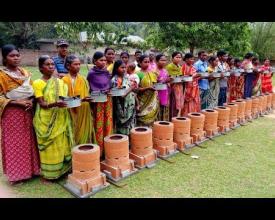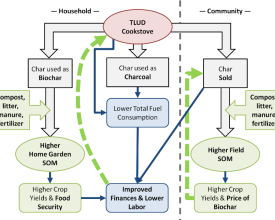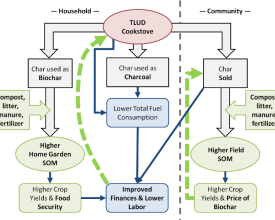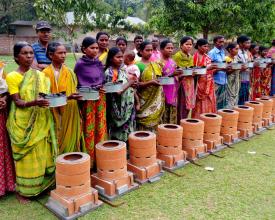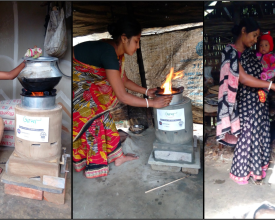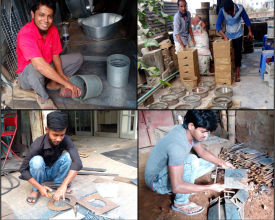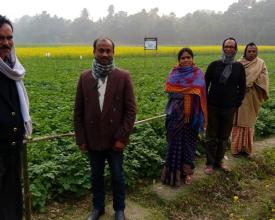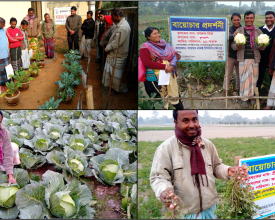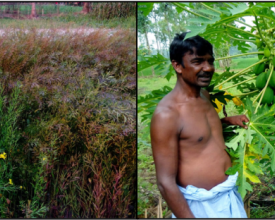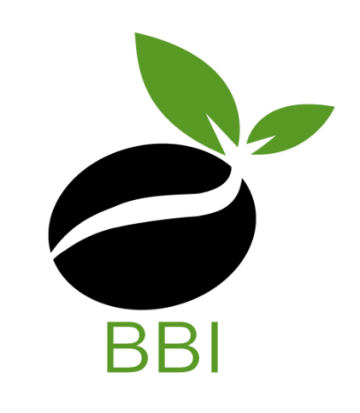
"Cookstove-Biochar Ecosystems" for Clean Cooking and Soil Restoration in Bangladesh
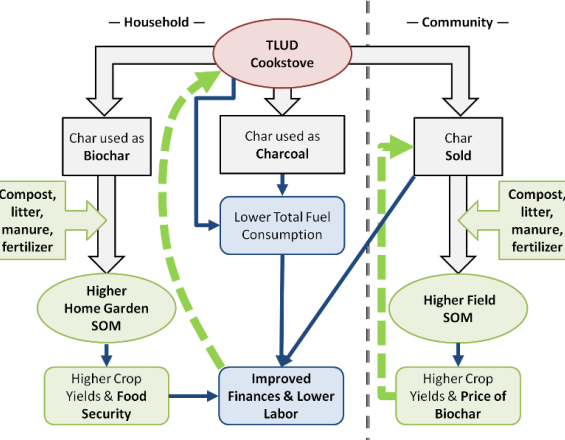
Bangladesh faces harsh challenges as it loses land to rising sea levels. However, the impact can be buffered if we raise the productivity of inland soils. Presently, yield is being limited by low soil organic matter. We can increase soil humus by applying biochar fertilizers. We have seen dramatic increases in crop yield. The challenge has been to make biochar, because good biomass in high demand for use as cooking fuel. We make biochar sustainably as a by-product of cooking by using a culturally-appropriate top-lit updraft (TLUD) gasifier stove for rural homes. When implemented in villages, we call this “the cookstove-biochar ecosystem” wherein the women with their cookstoves are ‘keystone’ species that make biochar possible, and farmers with their biochar are ‘ecosystem engineers’ that make ‘permanent’ increases in soil organic matter and biological productivity. Improved crop yields incentivize the adoption of cookstoves and the production of biochar.
Context
Challenges addressed
Our project is complex and multidisciplinary. In a proof-of-concept intervention, challenges were addressed, but all aspects need continued research and broader participation by scientists and development workers.
Env1: Demand for fuel wood is greater than the supply, so compressed biomass fuels should be developed.
Env2: Locally appropriate agronomic use of biochar has to be researched and demonstrated.
Soc1: Villagers have to be acquainted, and have practical experience with several technologies at the same time.
Soc2: The knowledge has to take root in the village. We deliberately target recipients who are innovators and curious to adopt new technology.
Soc3: Women have to prepare fuel for the TLUD stove, but that can be somebody's livelihood.
Ecn:1: The cookstove has to be affordable.
Ecn:2: The 'ecosystem' will not develop its postive feed-back loops until biochar has acquired a 'commercial' value by virtue of farmers' experiences with yields.
Location
Process
Summary of the process
The TLUD Cookstove - Biochar Ecosystem
There are many 'building blocks' in an ecosystem, but a only few of the play a predominant role. Ecosystems are usually named after dominant features or species, such as the Sundarbans or Sal Forests.
In our ‘ecosystem’ women with their cookstoves are ‘keystone’ species that make biochar. Farmers with their biochar are ‘ecosystem engineers’ that make ‘permanent’ increases in soil organic matter and biological productivity.
They interact through positive feed-back loops that reinforce each other through the flow of materials (biochar, manure, composts, foods, fuel) and money. Biochar could increase Akha acceptance
Biochar increases the productivity of the ecosystem, with creates new opportunities for livelihoods. Increases in cash income make it possible for families to purchase imported technologies such as photovoltaic energy, electronics, school supplies and medicines.
Other minor 'species' or 'building blocks' in the ecosystem include women making TLUD fuels, agri-businesses making biochar fertilizers, and university professors. This is called biodiversity.
Building Blocks
The "Akha" Top-Lit Updraft (TLUD) Gasifier Cookstove
A TLUD is a simple gasifier that is composed of a vertical tube that is filled with small pieces of wood, or densified biomass like pellets, balls or small briquettes. This is called a 'fuel bed.' It is ignited at the top, and underfed with primary air from a grate at the bottom. The ignition front travels down through the fuel by radiating heat into the raw fuel, drying it, and initiating pyrolysis. Released volatiles are ignited by the flame. The reaction is sometimes called a “migratory flaming pyrolytic front” (MFPF). Residual char is left on top of the fuel bed as the MFPF moves down.
The burning volatiles create an orange gas flame for cooking. Once pyrolysis is completed, the orange flame goes out, and the left-over char is colleded and smothered, or quenched with water.
We needed the "Akha," a culturally-appropriate TLUD for Bangladesh. It had to be made locally, study, and made with with as little (imported) metal as possible. Because of its heavy construction, it has a hinged grate for removing the char. To protect the Akha for free use, an there is an open-access patent. The current version of the Akha is a prototype being evaluated for acceptance, and obvious improvements can be made.
Enabling factors
For the Akha to be successful, it has to:
- have very low emissions of smoke
- be easy to operate and burn reliably without going out
- make char for use as biochar or as charcoal.
- burn less fuel than a traditional stove (even when the char is unburned)
Making char may be the critical enabling feature for Akha acceptance.
Lesson learned
The main lesson learned was that the Akha was well accepted by the women who were well trained in its use. We already knew the main limitations of a TLUD:
- It does not burn loose biomass, so traditional stoves will be saved for that purpose.
- It takes time to size woody fuel into small pieces, however, producing fuel for TLUDs may become some's livilhood.
- It does not burn wet fuel.
- It is batch-loaded with fuel rather than continuously stoked, to for long cooking times it will have to br reloaded.
- Women have to the trained on how to prepare fuel, and operate a TLUD.
Biochar
Char is carbonized organic matter that is produced by pyrolysis.
Biochar is char used for biotechnology, such as in agriculture.
Charcoal is char used as fuel.
Biochar has some important properties:
- Resistance against biological and chemical decomposition, so it lasts in soil for centuries and can be used to store atmospheric carbon.
- A high surface area
- Negatively charged surfaces and some positive charges with can hold soluble plant nutients such as nitrogen and potassium and other minerals.
In Bangladesh, the soils are often low in soil organic matter, because the warm-humid climate and agricultural tillage promote organic matter breakdown. Soil that are low in organic matter become hard and open pore space. Crop growth can be severely limited.
Given the excellent climate from growing crops, improving the organic matter in Bangladeshi soils can have profound results. Biochar can do this because it doesn't break down. Instead, it combines with manures, composts and soil organic matter to from new, stable humus.
By increasing soil organic matter there is:
- An increase in soil crumbs and large pore space
- Increased aeration
- Increased water penetration
- Increased plant-available water
- Increased soil life
- Increase root growth and crop yield.
Enabling factors
There are several key steps in getting biochar into common use:
- Scientific knowledge and practical knowledge of the use of biochar in Bangladeshi agriculture.
- Desimination of the knowledge to farmers
- Farmers' practical experience with biochar, so that they can evaluate what they would be prepared to pay for it.
Lesson learned
Farmers get excited about biochar once they witness the effects of biochar in research experiments, agricultural extension field trials, and local farmer trials.
In one case, after a tour of a farmer's field plots, some farmers came back later and carried off baskets of his soil.
Impacts
Top-Lit Updraft (TLUD) Gasifier Cookstoves compared to traditional biomass cookstoves:
- Drastically reduced exposure of women to cooking smoke.
- Automatically makes biochar as a by-product of cooking.
- Uses half as much fuel, despite producing biochar.
- Provides income through the sale or use of biochar.
- Improves women's qulaity of life and empowerment.
Biochar:
- Sequesters atmospheric carbon into soil organic matter.
- Increases soil biodiversity and productivity by building humus in organic matter-depleted soils. Soils with higher organic matter have:
- better aeration
- better retention of plant available water
- a buffered supply of plant nutrients
- Combined with urine and manures, conserves plant nutrients:
- reducing damage cause by eutrophication of water and NOx emission to the atmosphere.
- increases the efficiency of recycling plant nutrients
- reduces the need (cost) of commercial fertilizers.
- Improved crop growth
- increases household income and village economic activity
- increases the resiliance of crops to drought.
- allows Bangladesh - a densely populate country - to compensate (partially?) from land lost to rising sea levels.
Beneficiaries
Women and household: healthier, livelihoods.
Farmers: higher yields, lower costs.
Country: rural to urban migration; climate refugees.
Planet: C sequestration.
